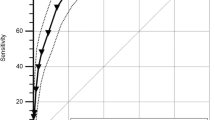Abstract
Introduction
The present study aimed at comparing the efficacy in recognizing depression, in 53 patients newly diagnosed with lung cancer, of the Hospital Anxiety and Depression Scale (HADS), a self-report screening questionnaire, and the Montgomery-Asberg Depression Rating Scale (MADRS), a semi-structured clinician-rated interview. Specifically, we aimed at addressing the question of which is the best HADS cutoff for the detection of patients to be further investigated through a clinical semi-structured interview (the MADRS).
Results
The MADRS identified 92% of the patients as depressed; the HADS, 70% and 87%, using a cutoff of 11 and 8, respectively. The results suggest substantial agreement between the HADS and the MADRS when a cutoff of 8 is used (McNemar: p = 0.51; Cohen K = 0.69), while a HADS cutoff of 11 resulted in a significantly lower concordance with the MADRS (McNemar: p = 0.002; Cohen K = 0.49).
Similar content being viewed by others
References
Ballenger JC, Davidson JR, Lecrubier Y et al (2001) Consensus statement on depression, anxiety and oncology. J Clin Psychiatry 62:64–67
Berard RMF, Boermeester F, Viljoen G (1998) Depressive disorders in an out-patient oncology setting: prevalence, assessment, and management. Psychooncology 7:112–120. doi:10.1002/(SICI) 1099-1611(199803/04)7:2<112::AID-PON300>3.0.CO;2-W
Bjelland I, Dahl AA, Haug TT, Neckelmann D (2002) The validity of the hospital anxiety and depression scale. An updated literature review. J Psychosom Res 52:69–77. doi:10.1016/S0022-3999(01)00296-3
Bulli F, Miccinesi G, Maruelli A, Katz M, Paci E (2008) The measure of psychological distress in cancer patients: the use of Distress Thermometer in the Oncological Rehabilitation Center of Florence. Support Care Cancer. doi:10.1007/s00520-008-0543-9
Costantini M, Musso M, Viterbori P, Bonci F, Del Mastro L, Garrone O, Venturini M, Morasso G (1999) Detecting psychological distress in cancer patients: validity of the Italian version of the Hospital Anxiety and Depression Scale. Support Care Cancer 7(3):121–127. doi:10.1007/s005200050241
Hopwood P, Stephens RJ (2000) Depression in patients with lung cancer: prevalence and risk factors derived from quality-of-life data. J Clin Oncol 18(4):893–903
Johnston M, Pollard B, Hennessey P (2000) Construct validation of the hospital anxiety and depression scale with clinical populations. J Psychosom Res 48(6):579–584. doi:10.1016/S0022-3999(00)00102-1
Kearns NP, Cruickshank CA, McGuigan KJ, Riley SA, Shaw SP, Snaith RP (1982) A comparison of depression rating scales. Br J Psychiatry 141:45–49. doi:10.1192/bjp.141.1.45
Landis JR, Koch GG (1997) The measurement of observer agreement for categorical data. Biometrics 33:159–174. doi:10.2307/2529310
Lloyd-Williams M, Freidman T, Rudd N (2000) Criterion validation of the Edinburgh postnatal depression scale as a screening tool for depression in patients with advanced metastatic cancer. J Pain Symptom Manage 20:259–265. doi:10.1016/S0885-3924(00)00182-2
Massie MJ (2004) Prevalence of depression in patients with cancer. J Natl Cancer Inst Monogr 32:57–71. doi:10.1093/jncimonographs/lgh014
Massie MJ, Popkin MK (1998) Depressive disorders. In: Holland JC (ed) Psycho-oncology. Oxford University Press, New York, pp 518–540
Montgomery SA, Asberg M (1979) A new depression scale designed to be sensitive to change. Br J Psychiatry 134:382–389. doi:10.1192/bjp.134.4.382
Muller MJ, Himmerich H, Kienzle B et al (2003) Differentiating moderate and severe depression using the Montgomery-Asberg depression rating scale (MADRS). J Affect Disord 77:255–260. doi:10.1016/S0165-0327(02)00120-9
Néron S, Correa JA, Dajczman E, Kasymjanova G, Kreisman H, Small D (2007) Screening for depressive symptoms in patients with unresectable lung cancer. Support Care Cancer 15:1207–1212. doi:10.1007/s00520-007-0225-z
Pignone MP, Gaynes BN, Rushton JL, Burchell CM, Orleans CT, Mulrow CD, Lohr KN (2000) Screening for depression in adults: a summary of the evidence for the U.S. Preventive Services Task Force. Ann Intern Med 136(10):765–776
Reich M (2008) Depression and cancer: recent data on clinical issues, research challenges and treatment approaches. Curr Opin Oncol 20(4):353–359
Uchitomi Y, Mikami I, Kugaya A, Akizuki N, Nagai K, Nishiwaki Y, Akechi T, Okamura H (2000) Depression after successful treatment for non-small cell lung cancer. Cancer 89:1172–1179. doi:10.1002/1097-0142(20000901)89:5<1172::AID-CNCR27>3.0.CO;2-U
Walker J, Postma K, McHugh GS, Rush R, Coyle B, Strong V, Sharpe M (2007) Performance of the Hospital Anxiety and Depression Scale as a screening tool for major depressive disorder in cancer patients. J Psychosom Res 63(1):83–91. doi:10.1016/j.jpsychores.2007.01.009
Zimmerman M, Posternak MA, Chelminski I (2004) Implications of using different cut-offs on symptom severity scales to define remission from depression. Int Clin Psychopharmacol 19(4):215–220. doi:10.1097/01.yic.0000130232.57629.46
Zimmerman M, Posternak MA, Chelminski I (2004) Derivation of a definition of remission on the Montgomery-Asberg depression rating scale corresponding to the definition of remission on the Hamilton rating scale for depression. J Psychiatr Res 38(6):577–582. doi:10.1016/j.jpsychires.2004.03.007
Author information
Authors and Affiliations
Corresponding author
Rights and permissions
About this article
Cite this article
Castelli, L., Binaschi, L., Caldera, P. et al. Depression in lung cancer patients: is the HADS an effective screening tool?. Support Care Cancer 17, 1129–1132 (2009). https://doi.org/10.1007/s00520-009-0604-8
Received:
Accepted:
Published:
Issue Date:
DOI: https://doi.org/10.1007/s00520-009-0604-8




